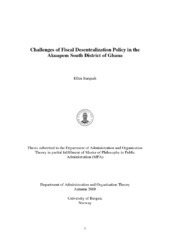Challenges of Fiscal Desentralization Policy in the Akuapem South District of Ghana
Master thesis
Permanent lenke
https://hdl.handle.net/1956/3972Utgivelsesdato
2008Metadata
Vis full innførselSamlinger
- Department of Government [455]
Sammendrag
The Government of Ghana introduced the decentralization concept in 1988 as part of hereffort/determination to make local government administration autonomous in Ghana. Themain aim of the concept was to make the people at the grassroots part of the decision makingprocess with the view to ensuring total socio-economic transformation of the country. Untilthen, decentralization was not a new phenomenon in the politics of Ghana, however, it hassince 1988, assumed a new dimension. New structures and institutions such as the NationalDevelopment Planning Commission (NDPC), and the District Assemblies Common Fund(DACF) were established by law. These structures and institutions sought to transfer means,skills, power and competence to the districts. The DACF is believed to be the majorinnovation under the reform. The fund, which constitutes five percent of the National Income(NI), is disbursed by the central government to the districts through the Office of the CommonFund Administrator. In addition, each DA is required to generate revenues from local sourcesreferred to as Internally Generated Fund (IGF) to supplement the DACF to carry out socioeconomicdevelopment of the local areas.It is against this background that, this study was carried out to describe and explain theimplementation process of the Fiscal Decentralization Policy in the Akuapem South Districtof Ghana. The study set out to describe the assumption that inadequate bureaucratic resources,lack of political resources, poor economic and social resource and lack of inter-governmentalcommunication and enforcement agency may impede effective implementation of the fiscaldecentralization policy in the district. The Mixed method approach of social science researchand a case study approach were used in the study. Interviews and questionnaires were used tosolicit data for the study.The research found out among things that the fiscal decentralization policy is underway.However, the ability and capabilities of the DAs implement the policy is affected by variousseveral factors namely bureaucratic resource such as technical, managerial and financialresource; political resource which implies the acceptance by the bureaucrats of the policy;economic and social resource such as the social condition prevailing at the time of theimplementation; and the inter-organizational communication and enforcement agencieswhich refers to the relationship between the policy makers and the implementers. The studyconcludes that for effective implementation of fiscal decentralization in Ghana there is theneed to provide the necessary resources intended for the policy.2The study seeks to investigate the implementation of the fiscal decentralization policy in theAkuapem South District of Ghana. It aims to highlight some of the challenges confrontingthe district in the implementation of the policy and the strategies being employed to meetthese challenges.
Utgiver
The University of BergenOpphavsrett
The authorCopyright the author. All rights reserved
